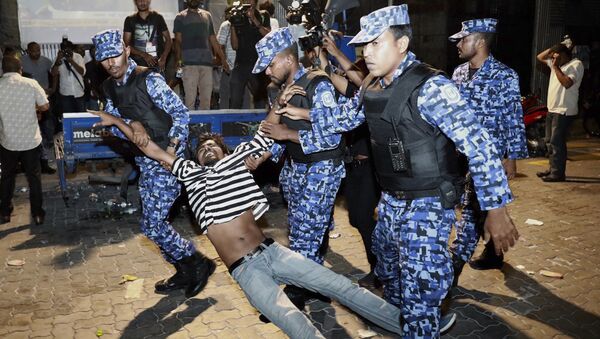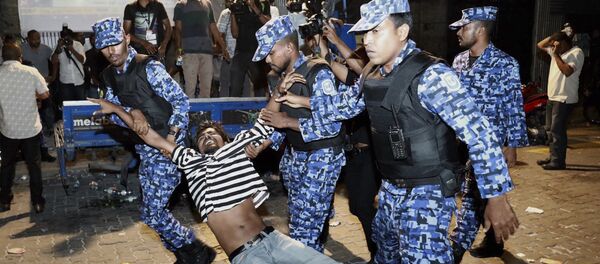Recent political turmoil in the Maldives reached a new height this week, when President Abdulla Yameen declared a 15-day state of emergency in the island nation. Police in the Maldives also arrested two key Supreme Court officials, who sided with the opposition led by former President Mohamed Nasheed in a recent ruling that overturned terrorism charges against opposition politicians and demanded their release.
"We would like the Indian government to send an envoy, backed by its military, to free the judges and the political detainees, including former President Maumoon Abdul Gayoom, from their detention and to bring them to their homes. We are asking for a physical presence," Nasheed said in a statement on Tuesday.
READ MORE: Maldives’ Opposition Wants Indian Troops on Ground to Diffuse Political Crisis
India has traditionally viewed the Maldives, located some 600 miles southwest of India's shores, as an important strategic ally. When a military coup attempt took place in 1988 against then President Gayoom, who ruled the Maldives for about 30 years until 2008, India dispatched about 1,600 paratroopers in an intervention operation, known as Operation Cactus, which helped Gayoom to stay in power.
No Condition for Military Intervention
As China continued to build stronger relations with current President Yameen’s administration in recent years, ensuring the ongoing political crisis in the Maldives tilts in India’s favor looks to be a priority for Indian authorities. However, current conditions in the political turmoil in the Maldives make it inappropriate for India to intervene militarily, Indian experts suggested.
"I think the Indian role would be quiet signaling, because India has hardly anything to lose. But India would have everything to lose, if it intervenes [militarily] directly, in terms of public image in the region. In the Maldives, [the crisis] is not about terrorism. There is no use of force [in the crisis]. There’s no violence and there’s no killing. There have been demonstrations. But everything stayed at a low-key level. You cannot use force in a conflict where arms are not used. Military option is not possible in the current situation, Srikanth Kondapalli, a professor in Chinese Studies at Jawaharlal Nehru University in New Delhi, India, told Sputnik.
The New Delhi-based expert explained that previous costly operations in similar foreign civil wars have made Indian authorities reluctant to engage in military intervention.
"India is not sending any troops after learning lessons from the Indian Peace Keeping Force (IPKF) operations in Sri Lanka. Some 3,000 Indian peace keeping forces were killed by the Liberation Tigers of Tamil Eelam. India is shy of intervening or sending boots on the ground to any country," he said.
India sent as many as 100,000 troops as part of its peacekeeping forces during the Sri Lanka Civil War in the late 1980s. The military intervention operations resulted in heavy casualties on the Indian side.
Direct Rivalry
According to professor Kondapalli, India has tried to maintain close relations with the Maldives, thanks to the island’s strategic position.
"The Maldives has traditionally been important to India because of the geographic proximity. In 1988, India sent its forces to restore [former] president Gayoom in containing a coup attempt. Subsequently, there has been a lot of flow between the two nations in terms of training programs, development and assistance, tourism and infrastructure development," he said.
However, as China started to adapt a more assertive foreign policy after President Xi Jinping took office in 2012, India’s alliance with the Maldives faced new challenges from a powerful and resourceful rival.
Subsequently, Maldivian authorities awarded the same project to the Beijing Urban Construction Group from China during Xi’s first visit to the country in 2014. The government of Maldives had to pay $271 million in compensation to India’s GMR for the abrupt termination of the contract, after a Singaporean Arbitration tribunal ruled in GMR’s favor in 2016.
READ MORE: Exiled Maldives' Opposition Leader Asks India, US to Help Remove President
The Indian scholar illustrated China’s growing influence in the Maldives.
"China constructed the [Maldivian] Foreign Affairs Ministry’s building and a number of bridges across islands in the country. The Maldives has about 1,800 islands with around 420,000 residents. Chinese tourism in the Maldives expanded substantially and included about 350,000 visitors annually, which almost matches the local population," he said.
However, professor Kondapalli pointed out that India’s geographic proximity to the Maldives continues to give New Delhi an upper hand over Beijing.
"The geographic proximity is also an important factor. A couple of years ago, a water treatment plant in Male was destroyed by accident. The whole city was facing drinking water crisis. At that time, India sent a destroyer with water resources within about a few hours. China sent assistance only after a week or so. It shows to Maldivian authorities that you cannot take geography out of consideration," he said.
China's Growing Influence
The incumbent Maldivian president, Yameen, looked to build stronger ties with China after taking office in late 2013. During Xi’s visit to the Maldives in 2014, the first visit by a Chinese president, Maldivian authorities announced plans to become part of China’s maritime Silk Road Initiative, also known as the Belt and Road Initiative. When Yameen visited Beijing in November, the two countries signed a groundbreaking free trade agreement.
"The Yameen administration developed close relationship with China. China has been expanding their capabilities and they now have extensive interests in other countries. They’re also taking more ambitious initiatives on what happens domestically in other countries," Harsh Pant, a professor of international relations at King's College, London, and a distinguished fellow at Observer Research Foundation, told Sputnik.
The expert suggested that President Yameen tried to build strong ties with Beijing because he understood that China is not a country that cares if he suppresses political dissidents.





